Create high quality UGC - Try Showcase for free
52% of marketers struggle with measuring influencer marketing ROI, so an Instagram tracking software is essential to attribute performance metrics accurately.
Influencer monitoring is vital to understand how much each influencer is impacting overall reach, engagement, impressions that your campaign is driving.
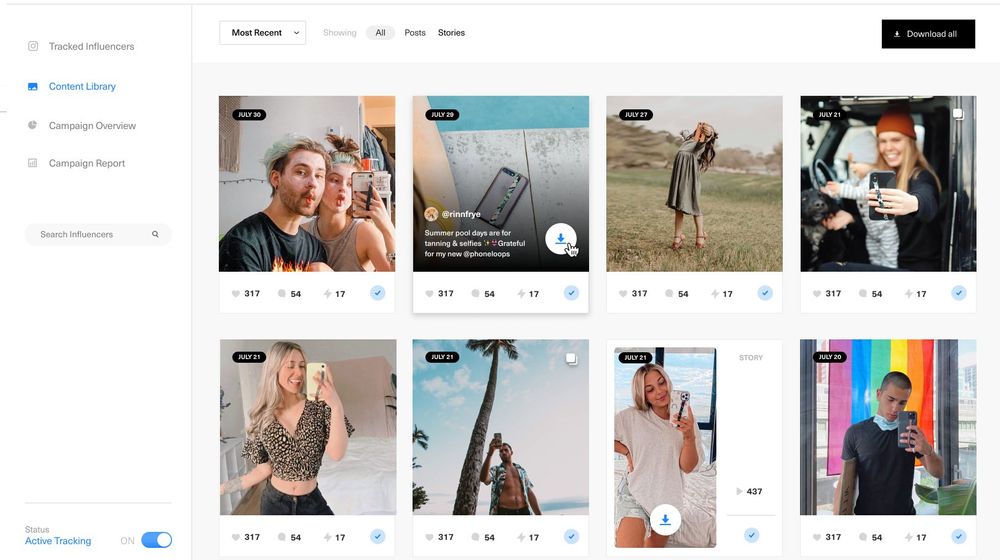
To boost your influencer marketing efforts, you need to figure out what works and what doesn't.
With influencer monitoring, you will make informed decisions and understand the impact of the campaign on your overall business growth.
Moreover, Instagram tracking software will help you allocate the maximum of your resources to the top performers and minimize waste by pulling the budget from the non-performing influencers.
In the long run, influencer monitoring will save you a lot of money and time.
In this article, I will show you how to track influencers manually and with inBeat Instagram tracking software.
TL;DR: Instagram Influencer Tracking Software
- Tracking influencer marketing ROI is crucial, as 52% of marketers face challenges in this area.
- Setting Clear Campaign Goals: Defining specific goals and KPIs is essential for successful influencer campaigns.
- Metrics to Measure: Identifying metrics like engagement, clicks, brand mentions, and impressions for ROI measurement.
- Manual Tracking: Methods for manually tracking influencers, including Instagram analytics and third-party tools.
- Challenges of Manual Tracking: The difficulties of manual tracking, such as time consumption and potential inaccuracies.
- Benefits of Instagram Tracking Software: Recommendations for using Instagram tracking software to save time and improve accuracy.
- InBeat's Monitoring Tool: Utilizing inBeat's influencer tracking and monitoring tool can enhance influencer marketing efforts.
- Tracking Process: A step-by-step guide on how to track influencer campaigns using tracking software.
- Assessing Results: Using data to assess influencer performance and optimize campaigns over time.
How to use Influencer monitoring tools?
Step 1: Set campaign goals to track ROI.
The first and the most vital step in any marketing campaign is to set clear objectives. Having specific KPIs lets you determine which influencers are right for your campaign, types of content, social media platforms, etc.
Some examples of common influencer marketing goals include:
- Build brand reputation
- Drive sales
- Reach new audiences/ expand existing ones
- Create brand awareness.
While these goals are great, you need to identify how to measure them. So dive deeper and set more specific metrics to track your campaign ROI.
Well-defined metrics should:
- Have a timeline. For example, you can track the increase in website traffic within one month of launch.
- Be specific. If your goal is to grow sales, define by how much in percent growth or dollars.
- Be achievable. Set realistic criteria for determining success. Otherwise, your influencer marketing campaign is bound to fail.
If you are unsure which metrics are right for your campaign, you can study what other marketers use for influencer tracking. For example, 90% of marketers use engagement, and almost 60% use clicks. Other performance metrics include brand mentions, impressions, follower growth, etc.
How to Track Influencer Marketing?
Influencer marketing is a hard channel to track. You should always understand what you are after, as mentioned previous. For instance, if you're looking to build your brand on Instagram, you should track follower growth. If you're looking for direct sales, track coupon code usage.
Why Use Influencer Tracking tools?
You can use Influencer monitoring tools like inBeat's tracking software. It allows you to track engagement and media value for a given post. Influencer tracking software makes measuring influencer performance much easier and more efficient.
How to Track Instagram Influencers Manually?
To measure engagement and brand awareness, you can use the Instagram analytics tool and monitor how the influencer marketing campaign is affecting your metrics.
For example, if your average weekly interactions, number of followers, and profile visits have increased since the start of the campaign, you can attribute this growth to influencers. It is valid if you are not running paid ads, and your content strategy remained unchanged.
You can also track your brand hashtags to see the number of posts, read comments, and find your earned content value.
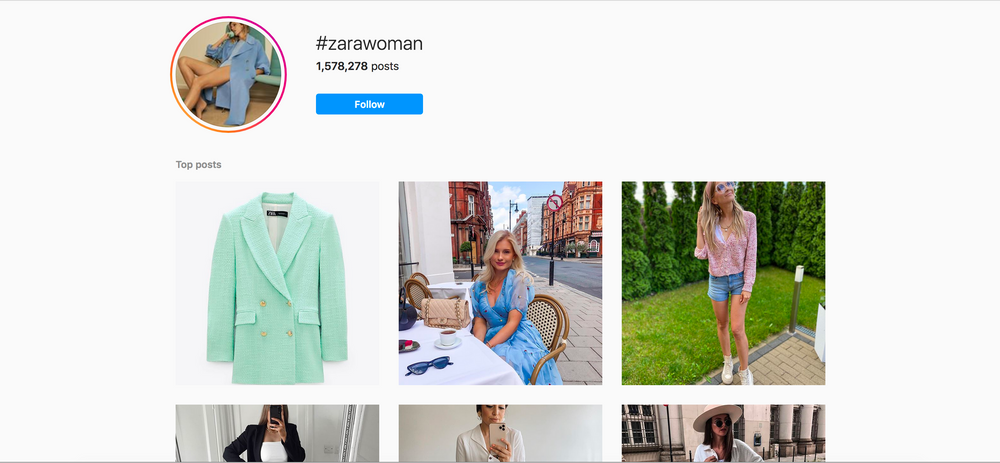
However, to monitor other metrics, such as influencers' post engagement, number of likes, reach, CTR, etc. you would need to ask influencers to send you their account analytics. You could also ask influencers to provide you with their analytics through a tool like Data Dashboard from NapoleonCat.
Additionally, you can use Google Analytics to check your referral traffic. The metrics for measuring campaign success include:
- Bounce rate
- Session length
- Pageviews
- Pages per session
Check the impact of the influencer's traffic to your website with these metrics and analyze the effect of the campaign on your website's SEO.
Thanks to its effectiveness, micro-influencer marketing is on the rise. So most of the brands work with dozens of influencers at once. So the challenge of manual influencer tracking is that it can be very time consuming, especially if you are working with micro-influencers and running several campaigns.
On the other hand, manual monitoring can be inaccurate if you are running ads on social media and use different tools to increase your brand's reach. So I recommend using an Instagram tracking software to save time and resources on monitoring your campaigns.
How to Track Influencers Using Instagram Tracking Software?
Once you found and selected the right influencers for your brand and launched your campaigns, you can start tracking by clicking on "My Trackings":
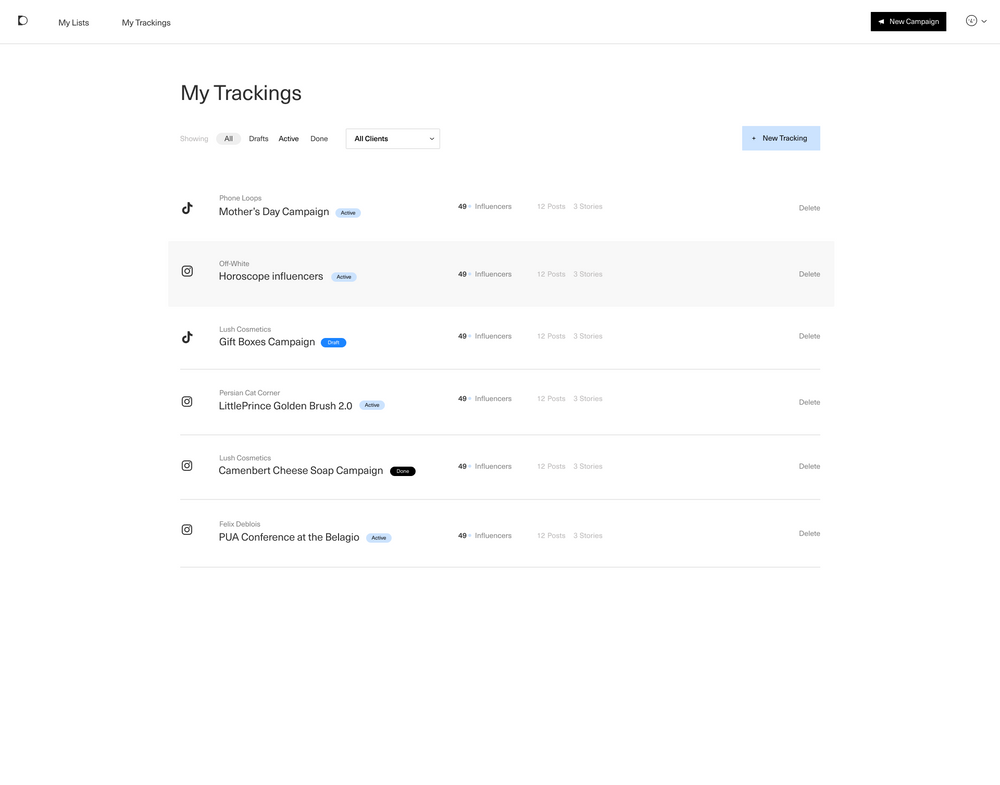
The dashboard shows all your campaigns. Filter your campaigns by active and done to get the metrics you need. If you are an agency and work with several clients, you can add new clients when creating the campaign. Then in the dashboard, select the client whose campaign you want to track from the dropdown list.
To create a new tracking campaign, go to the "Tracking Campaign Creation" page, select a client, or add a new one, name your campaign, and click "next."
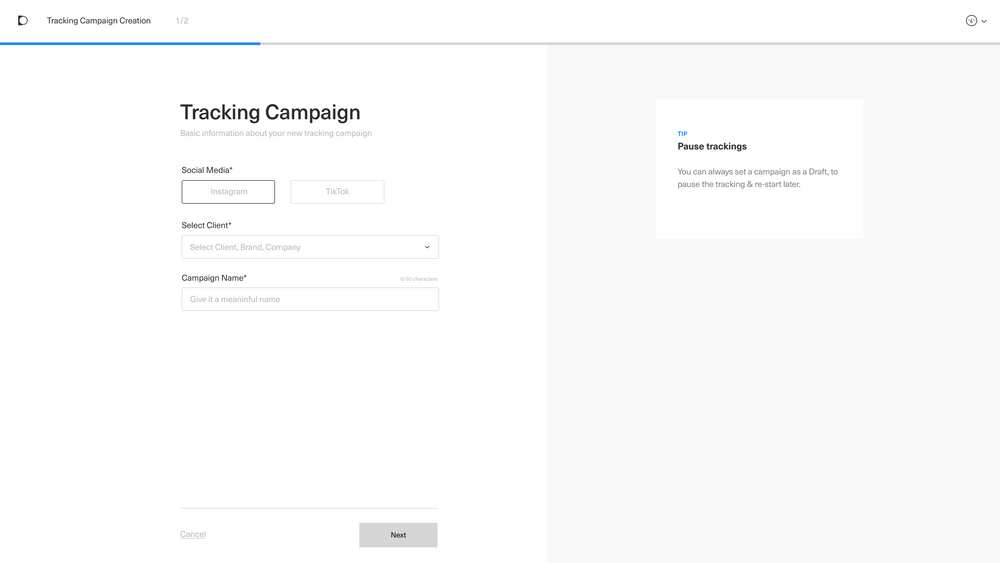
On the next screen, add the influencers you want to track by adding their social media @handles separated by commas, space, or enters:
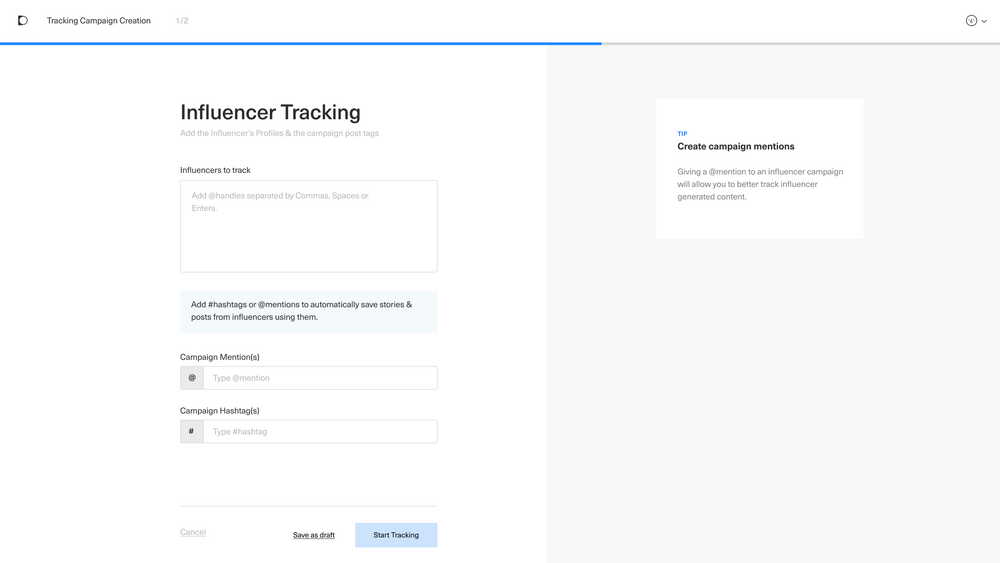
Make sure to type influencers' handles accurately and exclude private profiles that can't be tracked.
To efficiently track influencer generated content, create campaign @mentions, and add them to an influencer campaign. In addition to more accurate tracking, brand mentions are an essential social media monitoring tool that directly affects the brand's online reputation.
Create relevant campaign hashtags and add them to the influencer tracking tool. The software will automatically save posts and stories from all the influencers that use them. If you don't have a solid hashtag strategy yet, it is the time to start creating one. Posts with hashtags get more engagement and help you target specific audiences to raise awareness about your brand.
Once you added influencers, hashtags and mentions, click on "Start Tracking" to start monitoring your influencer campaign.
The software gives you options to track individual influencers, analyze the performance metrics for each campaign, and view the content library. The latter is quite essential if you would like to integrate influencer generated content to your marketing strategy.
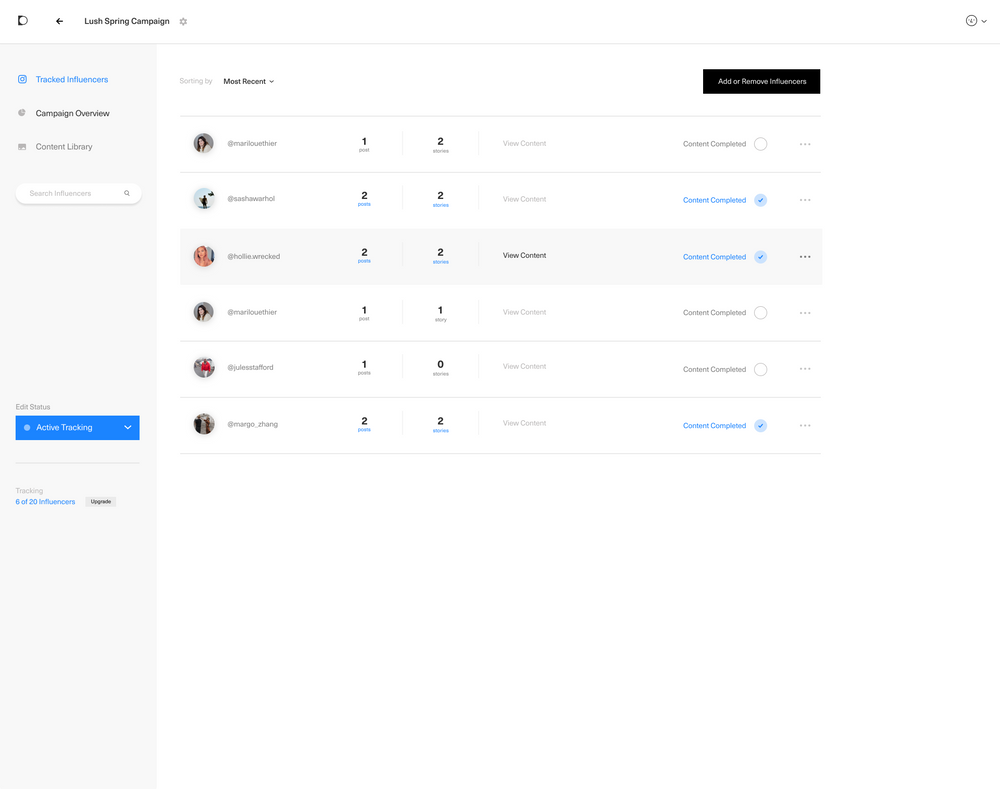
This tool will save you a lot of time when it comes to tracking individual influencers and your campaign's progress. Tick the "content completed," once influencers produced and posted the agreed amount of content.
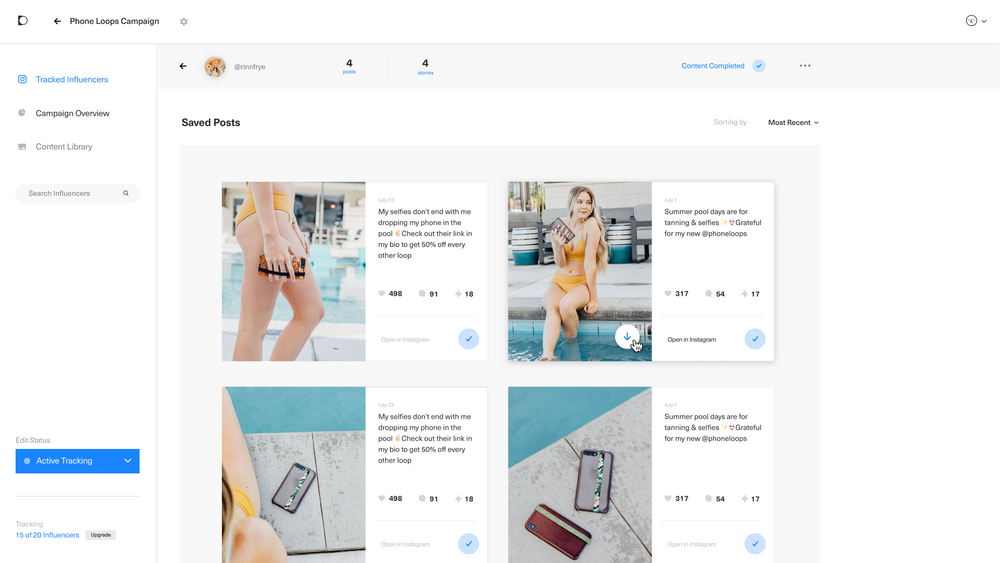
Assess The Results of your Influencer Marketing Campaign
Getting ROI from influencer marketing campaigns requires a proper measurement strategy. Using Instagram tracking software, you can assess your campaigns' success with ease and maximize the ROI from your influencer marketing efforts.
Once you have enough data about the performance of each influencer in your campaign, you can start filtering out non-performing influencers and leverage your relationship only with the top-performers.
Compile a list of top influencers and run a short campaign using the selected influencers only. By following this process for each campaign, you can increase ROI and maximize your campaigns' effectiveness. It is better to start with multiple short-duration influencer campaigns, use Instagram tracking software to monitor the results, and keep filtering out low-performers. Committing to a long-term campaign without having enough data could set you up for failure.
